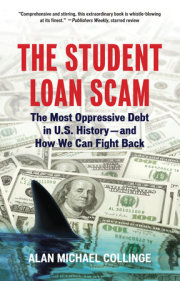
Citation:
Collinge, Alan Michael. The Student Loan Scam. Boston: Beacon Press, 2009. Print.
Summary:
In class we have looked at how universities as a whole have changed since they were first shifted from publicly funded universities to privatized corporations. Students have been the ones that have had to deal with this change, a once affordable form of education turning into one that many can only dream of. The student loan scam talks about the history of privatization when it first became popular in the 1970s. Large corporations like Sallie Mae were the first to start to privatize universities as discussed in “The Student Loan Scam,” and have made millions of dollars off of student debt because of their switch to privatization. This article gives a good backdrop at the history of universities and how privatization first developed and eventually took hold in the United States. Starting when their were first public universities, the book chronicles how colleges importance on student education has fallen in replacement of trying to earn profits. The entire mindset of colleges has changed since privatization began, focusing on furthering their own financial goals rather than increasing graduation rates.
Author:
Alan Collinge is the founder of StudentLoanJustice.org. He has written numerous articles, and editorials on the topic, and also published The Student Loan Scam in 2009. He was selected as one of seven "Financial Heroes" by CNN/Money Magazine in December 2008.
Key Terms:
Privatization. This is the focus of the entire article, showing how privatization in universities has erupted and really changed the landscape for students. Moving from being publicly funded to private funding, privatization has made a once affordable college experience out of reach for many students. The idea of privatization can also be connected to the solution of privatizing college athletics in response to a corrupt system in place by the NCAA.
Consumer Protection. This article talks about the lack of consumer protection that has come along with the privatization of many universities. Student loan companies have been able to exploit students with these loans and the federal government has done nothing to stop this, but rather is encouraging this behavior. This situation is reminiscent to the way student athletes are currently being treated by the NCAA, the schools focusing on exploiting profits through their athletic abilities and not on helping them attain their educational goals. Just as colleges are looking to exploit profits from their students through loans and do not care how their education is progressing.
Quotes:
“Over time, legislators gave more support to the interests of the student loan companies and the federal government than to the interests of the students.” (4)
"... The most obvious solution is abundantly clear: it is imperative that standard consumer protections be returned to student loans." (20)
"They often have so-called preferred-lender arrangements with the universities, which means that the school steers students toward a small number of lenders in exchange for financial rewards from those lenders." (6)
Value:
Given the history that we have learned about how oppressive privatization has been, it would be very interesting to now look at how privatization could be the answer to students problems in the future. An potential answer that has the potential to fix the current problem would be to privatize college athletics as a whole. One might wonder how this is going to fix athletics if privatizing colleges in the first place caused such a problem for students. With the privatization of college athletics, the NCAA would be dissolved and athletics would move to the public sector. This would mean that athletes would be considered employees of the universities and in turn compensated financially for working for the school. Athletes would no longer have to worry about keeping their amateur status and could focus on what they are there to do, play sports. The privatization of, specifically the athletic programs, would follow in the wake of what so many universities have already done. I think this could potentially serve as a great solution and this book has given a great backdrop to the history of privatization and how now it might be able to be used for the student's benefit.
No comments:
Post a Comment